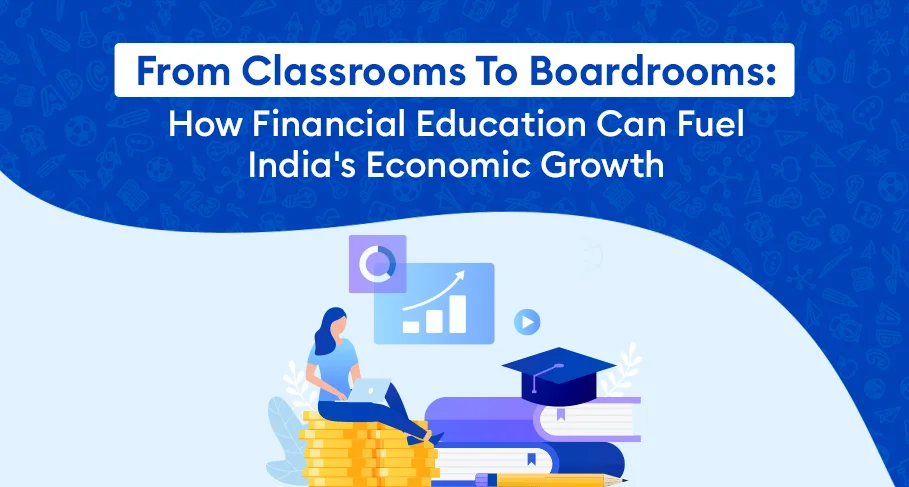Finance is undeniably crucial because it underpins our ability to meet basic needs, secure a better quality of life, and maintain safety and security. However, the awareness rate regarding money or fiscal issues of the ordinary Indian is painfully low.
SEBI reports that only 27% of Indian adults and 16.7% of Indian teenagers possess financial awareness and literacy, preparing them for a financially sound life. The problem lies in the lack of early education. As adults, people tend to prioritise money, but they cannot make intelligent decisions because of a weak foundation.
However, incorporating financial education in early schooling instils responsible money habits for lifelong financial stability and enhances critical thinking about spending and saving. This early exposure to financial concepts leads to informed decision-making in adulthood, significantly impacting their long-term economic well-being.
From classrooms to boardrooms, disseminating financial knowledge is the key to empowering individuals, fostering economic stability, and propelling India towards greater prosperity.
The significance of financial education at the grassroots level
Empowering Individuals
In India, equities markets account for 72% of the wealth of the ultra-wealthy. Students who receive financial education will be better prepared to create money through the stock market. It enables people to take charge of their financial health, handle money wisely, and make long-term plans.
Early Financial Habits
Schools offer a disciplined setting that is ideal for establishing sound financial practices in children. Teaching financial concepts such as investing, saving, and budgeting can foster appropriate financial habits that will benefit students in their adult lives.
Preventing Debt and Financial Stress
Students are less likely to fall into the debt and financial stress trap when they are educated in financial education. By using information to guide their decisions, they may steer clear of potential financial problems and risks regarding borrowing and credit.
Essential Life Skills
Just like reading and writing, financial literacy is a basic life skill. It prepares students to handle financial difficulties that arise in the real world, covering essential day-to-day tasks like filing taxes, paying bills and managing insurance.
Reducing Income Inequality
The wealthiest 10% of Indians hold around 77% of the country’s total wealth. One effective strategy for lowering this income disparity is financial education. It guarantees that students may acquire the skills required to accumulate money and attain financial stability, regardless of their background.
Encouraging Entrepreneurship
Students who possess financial literacy are more equipped to pursue entrepreneurship. They are knowledgeable in the fundamentals of risk management, investment, and corporate finance—all of which are critical for starting and expanding profitable businesses.
Improving Career Prospects
Almost all careers may benefit from a basic financial understanding. Students will gain from knowing personal financial and economic fundamentals whether they want to work in banking, healthcare, education, or any other industry.
Encouraging Responsible Citizenship
Financial education encourages responsible citizenship by educating students about the economic structures that influence their lives. Citizens with more knowledge can better engage in political and economic decision-making.
Economic Stability
A financially literate population contributes to economic stability at the national level. When individuals make prudent financial choices, it reduces the strain on social safety nets, enhances consumer confidence, and promotes economic growth.
Global Competitiveness
In an increasingly interconnected world, nations with well-educated and financially literate citizens compete more in the global marketplace. Evidently, only 7.3% of the Indian population invests compared to 61% of the United States’ adults. Economically savvy individuals will help bridge this gap, furthering India’s economic growth.
Since the National Education Policy (NEP) 2020, there has been an uproar in the need to make Indian academics more practical and skill-based. Most educators have adopted high-end courses like robotics but fail to make an impact with Financial Literacy.
This is incredibly demoralising because with less than one-third of the Indian population being financially literate, loan sharks have a widespread impact that exposes the unaware population to the vicious cycles of debt. The cycle affects India’s micro and macroeconomics, adding to the country’s total deficit.
Consider a scenario where children between the ages of 6 and 16 are introduced to so-called dull topics of tax planning, savings, budget planning, insurance, etc.
They are more likely to engage in early plans and invest, which, with the power of compounding, will grow substantially more when compared to receiving awareness at 25. Young, financially aware members of families and societies tend to influence the financial decisions of households and have a direct impact on bringing many sections of communities above the poverty line.
Albeit the long journey, the knowledge of legal loan programs like microfinancing, self-help groups, gram seva, etc., can reduce the debt cycle, forcing people to spend their lives in poverty. The timely intervention of the National Centre for Financial Education (NCFE) has enabled the passing of new guidelines where schools are advised to design the Money Smart School Program (MSSP).
Similarly, the Income Tax department educates students via comics to make tax subjects more straightforward and enjoyable. Mohammed Anwar Ahmed is one of the greatest examples of financial literacy changing lives. A humble farmer from Maharashtra’s Jalgaon district was in the village when Western India Vegetable Products Ltd (now WIPRO) had set up its factory in his town and had just listed itself in the NSE.
Post his conversation with a stockbroker, he understood the stock market and bought 100 shares worth Rs 1000 in 1947. Today, the valuation of those 100 shares is Rs. 500 crores.
Parting thoughts
As per a study conducted by IBEF, India has a bright future for financial literacy, where children between the ages of 10 and 19 will be offered end-to-end financial education in the next two decades. This will further contribute to economic growth & mass wealth creation, as already evidenced by an uptick in Demat accounts from 40.9 million in March 2020 to 100.5 million in 2023
Formal financial education will empower the young generation with lifelong skills, reduce financial stress, promote economic stability, and foster responsible citizenship. With an early start in the education system, we can better prepare the next generation to navigate the complex and ever-changing world of personal finance and contribute to their country’s economic growth.


